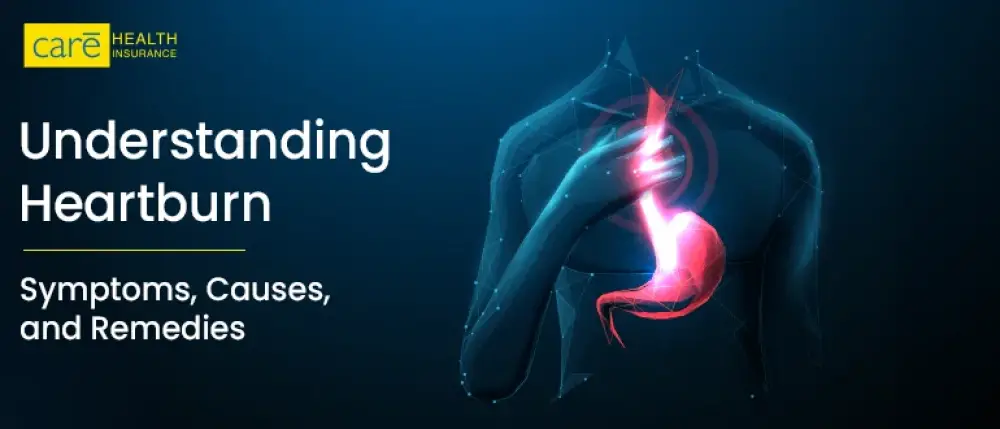Subscribe to get weekly insights
Always stay up to date with our newest articles sent direct to your inbox
Published on 2 Dec, 2024
Updated on 31 Mar, 2025
825 Views
4 min Read

Written by Anjali Sharma
favorite0Like
favoriteBe the First to Like
Heartburn is a common yet often misunderstood medical condition. It is identified by a burning sensation in the chest. In the critical conditions of heartburn, the stomach's contents, including acid, come up against the flow of food in the oesophagus (reverse peristalsis). While occasional heartburn is normal, frequent or persistent occurrences can indicate the presence of severe gastroesophageal reflux (GERD) disease. Getting the proper treatment for heartburn is important to avoid any inflammation or damage to the oesophagus.
Heartburn is a burning sensation or feeling of discomfort in the chest, mostly felt behind the breastbone. It generally occurs when stomach acid flows back into the oesophagus, the tube that carries food from the mouth to the stomach. Contrary to the name, heartburn has nothing to do with the heart; it is caused by digestive issues.
Heartburn symptoms are generally characterised by a burning sensation in the oesophagus (food pipe). Keep reading to understand the symptoms of heartburn:
There are several factors that can contribute to the development of heartburn, ranging from dietary choices to lifestyle habits.
Let us discuss some of the common causes of heartburn:
The heartburn treatment depends on the severity of the heartburn. Various medications, along with dietary and lifestyle changes can help in getting relief from heartburn.
Heartburn caused by acid reflux can be cured with home remedies. Here are some of the home remedies for heartburn discussed below:
There are several strategies that help to reduce heartburn. But if the heartburn extends for two or more times a week, it is advised to consult a doctor.
Here are some methods that you can try to reduce heartburn:
>>Read More: Symptoms of a Silent Heart Attack
Heartburn in occasional situations is common, and most people can manage it with daily adjustments. You should not leave the chronic heartburn medical condition untreated as it can signal more serious health-related complications. Always consult a gastroenterologist to get the right treatment on time.
While conditions of heartburn are not fatal, there are cases when people confuse a potential heart health issue with heartburn. Therefore, it is necessary to continuously keep a check on your overall health by taking at least one annual health checkup every year. And did you know that comprehensive health insurance generally comes with a complimentary annual health checkup benefit.
When purchasing a health insurance plan you must always check whether your insurer offers annual health checkup and the list of health checkups they offer to see if the concerned health checkups are covered in the plan.
Disclaimer: The above information is for reference purposes only. Kindly consult your general physician for verified medical advice. The health insurance benefits are subject to policy terms and conditions. Refer to your policy documents for more information.
favoriteBe the First to Like
Thyroid : मामूली नहीं हैं महिलाओं में थायराइड होना, जानें इसके लक्षण और घरेलू उपचार Vipul Tiwary in Diseases
शुगर कंट्रोल कैसे करे? जानें, डायबिटीज में क्या खाना चाहिए Vipul Tiwary in Health & Wellness
हाई ब्लड प्रेशर को तुरंत कंट्रोल कैसे करें? देखें इसके उपाय Vipul Tiwary in Diseases
पैरों में दर्द किस कमी से होता है? जानें, इसके घरेलू इलाज Vipul Tiwary in Health Insurance Articles
Cold Hands? Act Immediately Against Raynaud’s Phenomenon Jagriti Chakraborty in Diseases
Understanding Azotemia: Meaning, Causes, Treatment & ICD 10 Guide Leena Khowal in Diseases
Leukaemia vs. Lymphoma Breakdown: What Sets Them Apart Leena Khowal in Diseases
When Silent Clots Threaten Your Life: DVT Pratham Gupta in Diseases
Heartburn that happens everyday is a clear symptom of chronic acid reflux, or gastroesophageal reflux disease (GERD). Spicy foods and carbonated drinks can trigger the formation of excessive acid in the stomach.
Eating yoghurt or drinking milk might be helpful to manage heartburn during pregnancy. Stirring a tablespoon of honey in warm milk and then consuming it is also helpful.
To get relief from heartburn, you should drink water, milk or plant-based milk alternatives, herbal teas (e.g., chamomile, ginger, fennel), and low-acid fruit juices (e.g. apple, pear, papaya).
Heartburn usually feels like a burning sensation in your chest, and it can range from mild to severe. This sensation can start from the chest and reaches to the throat.
Always stay up to date with our newest articles sent direct to your inbox
Loading...